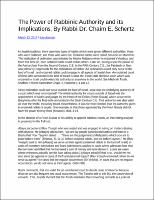Please use this identifier to cite or link to this item:
https://hdl.handle.net/20.500.12202/9102| Title: | The power of rabbinic authority and its implications |
| Authors: | Schertz, Chaim E. |
| Keywords: | rabbinic authority Ordained rabbis (smuchin) Ordained rabbis (Mumchin) Reish Galuta |
| Issue Date: | 13-Mar-2017 |
| Publisher: | SOY, Yeshiva University |
| Citation: | Schertz, C. E. (2017, March 13). The power of rabbinic authority and its implications. The YU Lambdan. https://yulamdandotcom.wordpress.com/category/uncategorized/ |
| Series/Report no.: | The YU Lamdan;March 13, 2017 |
| Abstract: | In Jewish tradition, there were two types of rabbis which were given different authorities: those who were ordained; and those who were not. Ordained rabbis were called Smuchin or Mumchin. The institution of ordination was initiated by Moshe Rabbenu when he ordained Yehoshua, and from that time on, each ordained rabbi could ordain others. Later on, during a specific period of the Patriarchate from the Second Century C.E. to the Fifth Century C.E., the Patriarch or Nasi was primarily responsible for the ordinations of rabbis. All ordinations could only occur in the land of Israel , and ordained rabbis could engage in all aspects of Jewish law. An ordained court of three who convened in the land of Israel is what the Torah calls elohimA court which was ordained in Israel could extend its authority to anywhere in the world. See Mishneh Torah, Shoftim, Hilchot Sanhedren Chapt. 4, Halachot 1-4 and 12. ¶ Since ordination could not occur outside the land of Israel, what was the underlying authority of a court which was not ordained? The initial authority for courts outside of Israel was the appointment of rabbis and judges by the Head of the Exiles (Reish Galuta) which occurred in Babylonia after the first exile and ended in the Sixth Century C.E. That authority was also valid all over the world, including Israel. Nevertheless, it was far more limited than the authority given to ordained rabbis or courts. One example, is that those appointed by the Reish Galuta did not have the power to levy fines (Knassot). Ibid, 4:14. ¶ In the absence of a Reish Galuta or his ability to appoint rabbinic courts, an interesting analysis is presented in the Talmud. |
| Description: | Blog entry |
| URI: | https://yulamdandotcom.wordpress.com/category/uncategorized/ https://hdl.handle.net/20.500.12202/9102 |
| Appears in Collections: | The YU Lamdan |
Files in This Item:
| File | Description | Size | Format | |
|---|---|---|---|---|
| Chaim Schertz March13, 2017 The Power of Rabbinic Authority and its Implications.pdf | 45.17 kB | Adobe PDF |  View/Open |
This item is licensed under a Creative Commons License

